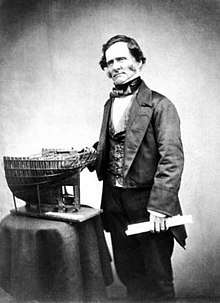Henry Wimshurst
Henry Wimshurst (1804–1884)[1] was a 19th-century British shipbuilder. Wimshurst was in business at Ratcliffe Cross Dock in east London.[2][3] He is remembered primarily as the builder of Archimedes, the world's first propeller-driven steamship.[4]
Henry Wimshurst | |
|---|---|
 Henry Wimshurst posing with a model of the stern of SS Archimedes. | |
| Born | 1804 |
| Died | 21 August 1884 |
| Nationality | British |
| Occupation | Shipbuilder |
| Known for | Construction of Archimedes, world's first screw-propelled steamship |
While Wimshurst cannot take credit for Archimedes' revolutionary propulsion system—which was the invention of Francis Pettit Smith—he was an "ardent supporter" of Smith and his technological breakthrough.[5] He would later claim to have proposed an improved, two-bladed version of Smith's original propeller which was subsequently installed on the vessel.[6]
After completing Archimedes in 1839, Wimshurst built a second screw-propelled steamship in 1840, Novelty, described as the world's first screw-propelled cargo ship[7] and the first screw-propelled ship to make a commercial voyage.[5]
Wimshurst himself had an inventive turn of mind, and filed a number of patents during the course of his career. In 1854, he built an experimental rotary steam engine, which when installed in a 300-ton screw-propelled ship, reportedly achieved an rpm of 45 and a top speed of 14 mph in tests conducted by the firm of Boulton & Watt. By comparison, a pair of conventional direct-acting engines later installed in the same ship achieved an rpm of 28 and a top speed of only 8 mph.[8] A few years prior in 1850, Wimshurst developed an instrument for measuring the power exerted by a propeller shaft—a forerunner of the torsion meter, an instrument for measuring the power transmitted by turbines.[9]
Henry Wimshurst was the father of James Wimshurst,[1] a late-19th century inventor who developed the Wimshurst machine and an early device for generating X-rays.
Footnotes
- "Centenary of James Wimshurst", Nature, No. 129, 9 April 1932.
- UK National Archives BT356/11458
- London Gazette 1849 issue 21003 page 2369
- Smith, p. 70.
- "Calendar of Industrial Pioneers", Nature, No. 110, 19 August 1922.
- Fox, p. 146.
- Smith, p. 72.
- Brooman, p. 36.
- Seaton, p. 25.
References
- Brooman, R. A. (ed.) (1854): The Mechanics' Magazine, Volume LXI, Robertson, Brooman and Co., London.
- Fox, Stephen (2003): Transatlantic: Samuel Cunard, Isambard Brunel, and the Great Atlantic Steamships, page 146, HarperCollins, ISBN 978-0-06-019595-3.
- Seaton, A. E. (1909): The Screw Propeller: and Other Competing Instruments for Marine Propulsion, page 25, Charles Griffin & Co., London, J. B. Lippincott Company, Philadelphia.
- Smith, Edgar C. (1905): A Short history of Naval and Marine Engineering, printed for Babcock & Wilcox Ltd. by University Press, Cambridge.